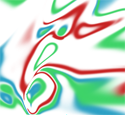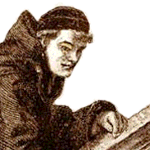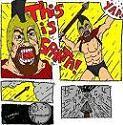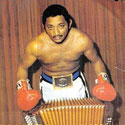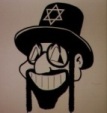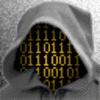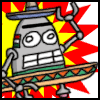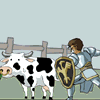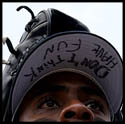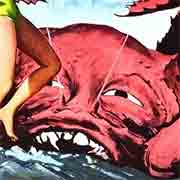|
 Whoa, have I been slacking on this thread. The last time I posted here I'd just gotten my kindle and I've been reading like mad, to the tune of twenty-three books! 48. L. Frank Baum - Tik-tok of Oz 49. Douglas Adams - Life, The Universe, & Everything 50. L. Frank Baum - The Scarecrow of Oz 51. Cormac McCarthy - The Road 52. Douglas Adams - So Long, And Thanks For All The Fish 53. Michael Moorcock - Elric of Melnibone 54. L. Frank Baum - Rinkitink in Oz 55. Douglas Adams - Mostly Harmless 56. Terry Pratchett - Unseen Academicals 57. Michael Moorcock - Sailor On The Seas Of Fate 58. L. Frank Baum - The Lost Princess Of Oz 59. Scott Adams - God's Debris 60. Michael Moorcock - The Weird Of The White Wolf 61. L. Frank Baum - The Tin Woodman Of Oz 62. Michael Moorcock - The Vanishing Tower 63. L. Frank Baum - The Magic Of Oz 64. Joseph Conrad - Heart Of Darkness/The Secret Sharer 65. Michael Moorcock - The Bane Of The Black Sword 66. Kurt Vonnegut - Slapstick 67. L. Frank Baum - Glinda Of Oz 68. Michael Moorcock - Stormbringer 69. Kurt Vonnegut - Deadeye Dick 70. Ruth Plumly Thompson - The Royal Book Of Oz The Road is covered more than adequately in the Book of the Month thread. There's pretty much the entire Elric saga in there. I love the hell out of those stories, they're full of swords and adventure and blood and guts and weird rear end dimensions and all that. Best of all they're brief, no thousand page epic tomes here! They still manage to convey that heroic aspect which is so entertaining. High points are the first and sixth books. Right now I'm reading Elric at the End of Time, which is a bit of a misnomer, since only the first short story features the character. The rest is a hodgepodge of some of Moorcock's other work, some of it quite old and showing less skill than the Elric stuff. There's also commentary I'm just skimming over since I'm just not interested in it right now. I finished up the Hitchhiker's series as well. (Not counting Eoin Colfer's addition.) Life, The Universe, and Everything feels more like a coda to the series, despite being smack in the middle. So Long, and Thanks for all the Fish is a nice There's a good chunk of Oz in there too. They're childrens' books, so the danger and conflict are all resolved or mitigated with fuzzy kitten stuff, but there are a couple near worrisome moments here and there. The series is almost like a tv show with each book being an episode. There's some continuity, with character development and arc progression, but by and large it's happy fun time fluff. The Royal Book of Oz is the first not written by Baum himself, but it's not all that noticeable. I liked Terry Pratchett's latest, Unseen Academicals quite a bit. It's the first discworld novel I've had to wait for. I do wish it had a bit more of the Wizards and foot the ball, and less of the Cinderella-ish B-plot. God's Debris, by Scott Adams the creator of Dilbert was a nice short philosophical story about the nature of God. Good and interesting, read in almost one sitting. Nice stuff to think about, but I'd hardly rave about it like Adams does in the foreward. He makes it sound like some groundbreaking treatise that will have you re-evaluating all you know about God and such, but really it isn't all that. Lastly, Vonnegut. Slapstick was great, easily one of his most entertaining and silly ideas for a novel. Deadeye Dick was more pedestrian, lacking the zany sort of things that sprinkle his other books. LooseChanj fucked around with this message at 15:30 on Dec 22, 2009 |
|
|
|

|
| # ? May 28, 2024 15:40 |
|
How to Watch TV News by Neil Postman/ Steve Powers. I didn't realize going in that the book would be so dated, and the main thrust, that corporate news exists to entertain and sell commercials, shouldn't be a big surprise to anyone.
|
|
|
|
I also just finished Mistborn, by Brandon Sanderson, yesterday, and I am now 96% done with the next book in the series according to my kindle. These books are very well done, in my opinion. Usually in these types of fantasy books you can see what is going to happen, long before the end of the book. However, these two books had some surprising twists. Looking back I can see the hints given to what would happen. The blurbs at the beginning of the chapters also added another dimension to the story. Also, the series has a very unique magic system with interesting subtleties. I am very impressed overall.
|
|
|
|
I just finished On Killing by Dave Grossman. It was a fantastic read that teaches us about human psychology and the effects killing has on us. The physical and psychological distance from a person plays a huge role in determining whether or not a human will kill and what effect it will have on them. I was surprised that firing rates among soldiers in combat were so low historically and how effectively you can condition someone to kill. I'm not sure I agree with his opinions on video games and their culpability in active aggression, but I do think violence needs to have more of a role than sex in determining appropriate ratings for TV and movies.
|
|
|
|
I just finished Post Office by Charles Bukowski. I didn't like it at all, and I wouldn't recommend it to anybody over the age of 14. The plot is senseless, the cardboard characters (especially the narrator) are so underdeveloped that you'll never understand any of their motivations, and the prose is only written with the words that Hemingway threw away. Avoid it.
|
|
|
|
Just finished Carter Beats the Devil by Glen David Gold; it's a fictionalized version of the life of Charles Carter, a famous 1920s magician. He's chased by Secret Service agents, he courts a blind girl, and he puts on the magic show to end all magic shows. Haven't had this much fun reading a book in quite a while.
|
|
|
|
I finished Blood Meridian and enjoyed it, however, not as much as it seems most people on this board did. It was good book, no doubt, but I enjoyed No Country and Child of God a bit more. Also finished Grave Peril from the Dresden Files series. I am loving this series so far.
|
|
|
|
I just finished Dan Brown's latest installment in the Robert Langdon series The Lost Symbol. I've enjoyed his other books and am glad that I picked this one up as it was a very enjoyable "edge of the seat" read.
|
|
|
|
Just chiming in that I finished The Anubis Gates. I think I'm still recovering from everything, especially the ending.
|
|
|
|
I just finished Animal Farm by George Orwell and I loved it. It solidified Orwell as one of my favorite authors. His endings are so powerful. Next up? Infinite Jest to distract me from my plane ride and 24 hour layover to Peru.
|
|
|
|
I just finished Eminent Victorians by Lytton Strachey, written in 1918. It is a non-fiction collection of four biographies, and the title makes it sound like the most boring book ever written. I have heard it referred to as a groundbreaking work in biographical style, giving sketches of the character of the individuals instead of just the events of their lives, so I thought it might be worth a read. It was a pleasant surprise. It gives witty, entertaining accounts of the lives of four people: Cardinal Henry Manning, Florence Nightingale, Thomas Arnold, and General Charles Gordon. The portrayals are witty, entertaining, sympathetic, and quite cynical. My only complaint about the book is that Mr. Strachey is often too cynical about his subjects. A thumbnail sketch of the people: Cardinal Henry Manning: Notable for being a leader of the Oxford Movement in the Church of England, then converting to Catholicism, eventually becoming a cardinal and representing the English Catholics at the First Vatican Council—or more accurately, representing the Vatican in its attempts to crush the Gallican tendencies of the English Old Catholics. Florence Nightingale: Everyone knows about her heroism at Scutari during the Crimean War. Mr. Strachey, however, shows how she wasn't as saintly as has been portrayed, having an abrasive, combative personality and a suspicion of medical science. Thomas Arnold: The head of the Rugby School who devised his own new methods of teaching to make boys into "Christian gentlemen." He was a skilled preacher, but a poor educator whose curriculum was just Latin and Greek with no math or science, and little history. General Charles Gordon: The wrong man for the job. He was sent to evacuate Khartoum to save its inhabitants from the Mahdi uprising. He decided that he was going to liberate Sudan instead. His attacks were ineffectual, and Khartoum was besieged for a year before Prime Minister Gladstone finally sent troops to rescue the general that had been sent to rescue Khartoum. They arrived only two days after the city fell, and General Gordon was already dead.
|
|
|
|
Done with Pnin by Nabokov. Not his strongest book but it's clear from beginning to end who wrote it. I've got a low tolerance for self inserts in books but his comes off as the kind of thing only Nabokov would write. I also like the subtle Dostoevsky trolls everwhere. The Anna Karenina love affair gets a bit old. This is the third of his openly and obviously autobiographical novels to this point, it's the weakest of the three. The prose is probably about on par with Bend Sinister or Real Life of Sebastian Knight. Its strongest work is done on matters of the heart, as is always the case with Nabokov. Mina reminds me of Mary, probably because they're the same girl from his autobiographical past. I'd recommend this with reservations--it's distinctly a lesser work of a greater writer.
|
|
|
|
Wiley360 posted:Just chiming in that I finished The Anubis Gates. I think I'm still recovering from everything, especially the ending.
|
|
|
|
QVT posted:I just finished Post Office by Charles Bukowski. I didn't like it at all, and I wouldn't recommend it to anybody over the age of 14. The plot is senseless, the cardboard characters (especially the narrator) are so underdeveloped that you'll never understand any of their motivations, and the prose is only written with the words that Hemingway threw away. Avoid it. LOL (Laugh out loud, an acronym). Is this an obvious troll? I mean, it seems so perfectly crafted to make no mention of anything that happens in the book, so I'd at least wonder if that post could possibly even less specific. And I'd say that the only thing comparable between Hemingway and Bukowski is that they were both alcoholics.
|
|
|
|
Haplo26 posted:LOL (Laugh out loud, an acronym). I can see why you like Bukowski. Here's what happens in the book: some consensual sex, one(possibly two!) rapes, considerable thinking about sex, considerable thinking about how "big" various body parts of a girl are, two common law marriages, one real marriage, three real divorces, extended chapter long descriptions of the day to day goings on of the post office, extended chapter long descriptions of horse racing, and CAPS FOR EMPHASIS. The Hemingway mention should be obvious. Bukowski writes like he's talking, Hemingway writes like he's editing.
|
|
|
|
Hahah, responding with thinly veiled disaparagement and an ad hominem attack. Good start. Yeah, great, you grasped the plot, it showed evidence that you read it. Kudos really, for illustrating that the book has the theme of Bukowski's semi-autobiographical experience with many relationships that he both experiences intimately, and those he experiences second hand. Now, the main thing Bukowski is known for is his description of some of the various high or lowpoints in his life, often related to his own degeneracy and inability to have a functional intimacy with anyone because of his own self-obsession and introversion, due mainly to his awful childhood and complete inability to be more proactive about getting out of the system so he succumbs to doing the most monotonous mind numbing work. I think Post Office is really pertinent now in that many highly educated, intelligent people are stuck in working jobs or situations because they have to make ends meet to survive, and at every level the system abuses you and degrades your personality because it doesn't really matter that you chose whatever line of work, the bureaucracy is more important than you. While the parallel isn't exact, because Bukowski chose his nihilistic path as a vehement rejection of the system almost immediately, and in contrast, people often have the choice and a less dismal outlook on what to do with their lives, especially if the economy eliminated their positions, etc. BUT, even in the face of all that, Bukowski still appreciated the things in life which made him happy, mainly sex, alcohol, art and his writing poetry. Many times he mentions how whimsical and stupid it is that all of a sudden he's a famous and recognized poet and how that recognition, even though it grants him escape from the tedium of the jobs he worked, never meant anything to him personally. Anyways, I've often viewed Bukowski's life and message more about a discourse on the type of lives many peope have no choice but to live, and I think Post Office deals with only a few things I've written and the end of it is basically him bottoming out and beginning to write everything into the book. Also, I am generalizing a bit because that's what I have to work with.
|
|
|
|
That being said, I can understand people for not liking Bukowski. A lot of his points are directly made from his viewpoint and everything he says is based entirely on his belief system, so if you can't appreciate that at all then yeah, he's not really for you. Furthermore, the wrong crowd seems to glamorize him and his lifestyle, whereas he lived destitute for most of his life and behaved incredibly anti-socially for all of his life, and for some reason a lot of people glorify that and see it as one of the only ways to reject society. Characters don't develop insomuch as Bukowski sees them and injects them into his condition, but since he lived primarily alone and basically hated people, people in his life rarely stuck around for him to write about their development.
|
|
|
|
Just finshed Glenn Beck's "Common Sense" I liked it even though I'm not a big Glenn Beck fan. The first half is his attempt to do what Thomas Paine did in 1776 the later is Thomas Paines' original Common Sense. Whether or not you agree with some of the things Beck says, having the original Common Sense is a nice read. It gives you a perspective of America not that we're failing now, but there there have always been ups and downs in the economy and government.
|
|
|
|
Ishvara posted:Just finshed Glenn Beck's "Common Sense" I liked it even though I'm not a big Glenn Beck fan. The first half is his attempt to do what Thomas Paine did in 1776 the later is Thomas Paines' original Common Sense. Whether or not you agree with some of the things Beck says, having the original Common Sense is a nice read. It gives you a perspective of America not that we're failing now, but there there have always been ups and downs in the economy and government. Holy gently caress you're serious aren't you? I just finished The Museum of Dr. Moses by Joyce Carol Oates. Not as good as The Female of the Species but I really like her short stories and want to try a novel of hers now but there are so goddamn many of them.
|
|
|
|
Just finished Fear and Loathing In Las Vegas and The Rum Diary both by Hunter S Thompson. Fear and Loathing was brilliant, saw the film first which I also really, really enjoyed. The Rum Diary was also pretty good, a bit slow though.
|
|
|
|
Just finished Under The Dome tonight (as book on CD). This was the first King book I'd ever read and was a little let down. The story was actually really good and I liked almost everything about it, but the length of the thing seemed unnecessary. The TBB thread on the book mimics my feelings on it overall, so I'll leave it at that.
|
|
|
|
I've been reading lately two novels by a local writer called Cristovão Tezza. As of now, he's not very well known, but has been slowly gaining some recognition outside of Brazil. His latest novel, O Filho Eterno (The Eternal Son) has received many awards, like Portugal-Telecom Award, and has been translated into Italian, Spanish, English, Catallan and Dutch. I haven't read it yet (though I bought it on the premiere, so to say, directly from him, autographed), I preferred to read some previous works beforehand. These were: Trapo (literally "Rag", but has no translation into English as of yet) - it's the story of a retired literature teacher whose life is turned upside down one day when he receives into his possession the whole of the unpublished originals of a young poet (who calls himself Rag) who committs suicide before the beginning of the narrative (so it's not like I'm spoiling anything). Naturally, the poet's work is juvenile, naive and pretty bad overall and the protagonist hates him at first, but Rag's personality slowly begins to resonate with him and he feels obliged to understand him and the reasons that drove him to suicide. The prose is in the first person, alternating between the protagonist's point of view and Rag's letters and both personalities and styles are very well defined and allow you to see well into the characters' minds, how they perceive themselves and are perceived by others. It's a pretty good novel, overall, and I'd recommend it if it were translated into English. Aventuras Provisórias - (literally "Provisional Adventures", but again, no translation). Tells the story of a businessman (the first person narrator) whose friend has just got out of political prison (Brazil used to be a dictatorship until the 80's) and begins living in a hippie commune, until something goes horribly wrong near the ending. The narrator tells of his friendship with this guy and his own experience visiting the commune (naturally, he, being a borgois, as well as the misadventures in his love life. A short, quick and easy read, maybe not as psychologically probing as Rag but nonetheless enjoyable, accessible without being shallow. Oh, my, this has centairly grown into a longer post than I expected it to be. It's a real shame the Portuguese language is so culturally isolated. I hope Tezza (as well as another of our succesful local writers, Dalton Trevisan) becomes more known in the future, I think he deserves it, and it's not because he's from my city. If anything that's a reason for me to be even more critical.
|
|
|
|
The Whiskey Rebels by David Liss - An interesting "historical thriller" set in Pennsylvania in the years after the Revolutionary War and during the Whiskey Rebellion period, as the title suggests. It's not a bad read - solid prose, lots of good historical detail and the two main characters are both interesting, but the plot didn't really grab me as much and seemed overly convoluted. Liss has written a couple other books in the same vein that sound interesting, so I'll have to try those to see if they're a bit better, though. Finch by Jeff VanderMeer - I've been a big VanderMeer fan since I discovered him several years ago with City of Saints and Madmen and Finch, his most recent book, just reminded me why I love this guy. The story returns to his fictional city of Ambergris some time in the future after the events of the last Ambergris book, but here VanderMeer gives us his own version of the detective novel. The prose is reminiscent of James Ellroy's crime fiction if Ellroy had spent his formative years eating shrooms instead of peeking in windows, combined with a dash of Cronenberg's body horror, resulting in a grotesque tapestry of fruiting bodies and disintegrating detectives, set in a future Ambergris where the mysterious gray caps have overthrown the humans and imposed martial law. A fantastic wrap-up of the mysteries posed in the previous two more or less stand-alone Ambergris books and I'm still impressed by the total stylistic shift from his last book Shriek: An Afterword. The Creators: A History of Heroes of the Imagination by Daniel J. Boorstin - a companion volume to Boorstin's The Discoverers, which I read some months back. Where "Discoverers" presented a "big picture" history of man's struggle to understand the world and himself via timekeeping devices, exploring the globe, medicine, etc. - "Creators" does the same for man's attempts to create architecture, painting, music, dance, writing, etc. I didn't find it quite as intriguing as "Discoverers" - some parts seemed a bit dry, but there is a massive amount of fascinating detail to be had here and Boorstin's style in both books is very engaging without being dumbed-down, for the most part.
|
|
|
|
I just finished John Dies at the End by David Wong. It was a pretty enjoyable book with an interesting story and writing style however it was fairly obvious that it was written piecemeal. In the end it could have probably used a stronger edit to make it a little more cohesive. Also it really felt like it was actually just two books stuck together with the bookend device added on later. Once they finished with the whole Vegas part of the story could have easily just ended the book there. It also has some fairly clumsy foreshadowing that takes far too long to pay out. All in all I have to say the pluses outweigh the negatives and I enjoyed it enough to read any sequels that he puts out and whenever the movie gets made I'll see that too.
|
|
|
|
I just finished 2666 by Roberto Bolano. *collapses* *exhausted* It'll take me a while to formulate my thoughts, I think. A flawed masterpiece, and an important novel.
|
|
|
|
A Canticle For Leibowitz This starts out so very promising and is a satisfying read. The first part is exceptional, the remainder of the book is a little disjointed and was not as appealing to me.
|
|
|
|
"The Name of the Wind" by Patrick Rothfuss. Is gearing up to be the next G.R.R. Martin. Already has the delaying book release part down pat. Still an excellent author.
|
|
|
|
Umberto Eco - Foucault's Pendulum. My last book of the year, wanted to finish it before new years' eve. Enjoyed it a great deal, Eco's got not only a highly enjoyable prose but quite a encyclopedic knowledge of pretty much everything. I really liked that every part had a corresponding caballistic Sephira that would somehow lay out the themes for them. When the protagonist visits Brazil, I thought there was a chance he could screw things up a bit, but he nailed it all about African-Brazilian rites and about our social situation back then in 1988. Plus, he's funny as gently caress. It was a heavy read, but totally worth it. I had plans to begin Pynchon's Mason & Dixon, but I guess now I'll start 2010 by reading something a bit lighter and devoid of crazy conspiracy theorists and telluric currents.
|
|
|
|
Bluebeard, Kurt Vonnegut This was billed as a mystery, but really it's another example of Vonnegut's novel length jokes, and the punchline was absurdly and wonderfully unbelievable. Siddhartha, Herman Hesse One man's journey to enlightenment in the shadow of Buddha. The last thing I'd have expected to be written by a german, but Hesse had spent some time in India so it should be all that surprising. That makes 74 books this year!
|
|
|
|
Still reading The City and the City so that'll be the first book I finish in 2010. I read 131 books this year according to my GoodReads.com account. I read really fast, apparently. *brandishes e-penis*
|
|
|
|
Raced through William Gibson's Neuromancer in two days. First sf novel I've read in a long time, and I thoroughly enjoyed it. Gibson portrays in rich, convincing detail the sort of grim, debauched, technophiliac, and utterly fascinating near-future world that I would want to experience myself - though not too long, admittedly. Those who aren't into hard science-fiction or have no affinity for that particularly 1980s kind of future aesthetic probably needn't apply, but anyone with a bit of a cyberpunk kink should feel right at home.
|
|
|
|
Just finished Andre Agassi's autobiography Open It made headlines in the tennis world because Andre said he hated tennis and he admitted to taking meth and failing a drug test during his career. The first fourth of the book was pretty good when he was talking about his overbearing father and how living at the tennis academies was hell. But the rest of it is pretty boring. Don't even bother with this book if you're not a tennis fan.
|
|
|
|
The Canterbury Tales ^_^ (USER WAS PUT ON PROBATION FOR THIS POST)
|
|
|
|
Two recent finishes in the last week: The Book of Lost Things by John Connolly. It was an interesting book, full of dark fairy tales and whatnot. I enjoyed it well enough. The Raw Shark Texts by Steven Hall. I picked this up on sort of a whim at Half Price Books the other day just because it was a debut novel and looked interesting. It was a weird book, but still a decent read and refreshingly original.
|
|
|
|
I forgot to mention I'm Dying Up Here: Heartbreak and High Times in Stand-up Comedy's Golden Era by William Knodelseder which is a great chronicle of the "Golden Age" of stand up, mainly in Los Angeles in the 70s. The book reads wonderfully and tells the stories of different comedians, some obscure and others well known such as David Letterman and Jay Leno. It has a really human touch, many of them were working for no money and just praying for a big break, and its really interesting to think about what they were going through. Also, the book covers their comedy strike at The Comedy Store and that was an interesting story. There's also little tidbits, some cool photographs, such as David Letterman and other well known comedians in a basketball team, and it's really just a fun read.
|
|
|
|
LooseChanj posted:Bluebeard, Kurt Vonnegut This was probably my favorite Vonnegut book, although I really should go back and read Slaughterhouse 5 again, since it has been many years. Anyhoo, just wrapped up The Broom of the System a few days ago. It was a fairly complex novel, and I feel like I'm going to have to go back and re-read it because David Foster Wallace operates on a totally different level. I know I'm missing some subtleties, but I don't know where, which is an interesting problem. But I'm going to leave that for awhile. On to Infinite Jest! I made a happy decision in the book store because I knew I was going to buy a DFW novel, but I decided against Infinite Jest because it looked pretty intimidating (this was before I knew just how complex it was going to be). Glad I picked up BotS first just to get the hang of his style.
|
|
|
|
Mieville's The City and the City - Have to agree with the general consensus in the Mieville thread. A really fascinating idea with a lot of metaphysical implications, though the detective story angle doesn't totally work. It's not a bad book by any means, just lacking a bit in execution plot-wise. Had Mieville chosen a different approach to it or perhaps at least made the existing book a bit longer, it might have come out better, I think. However, it's nice to see him actually doing something else instead of running the Bas-Lag universe into the loving ground like some authors would have. Encryptic fucked around with this message at 01:26 on Jan 3, 2010 |
|
|
|
Heir To The Empire. Finished it about ten minutes before the plane landed. So now it's on to Dark Force Rising. I'd listened to the books on tape for the Thrawn trilogy about eight years ago, and I'm hoping the text provides more detail about a few events. Specifically, I was really hoping there was more to it than oh, by the way, they discovered Jorus C'baoth is an insane clone. Serving that up in a single sentence felt like a cop-out.
|
|
|
|
Tonight I finished The Penelopiad by Margaret Atwood, which is a rewrite of "The Odyssey" from Penelope's point of view. The chapters alternate between Penelope's narration of her life and a "chorus" of her maids who interrupt with songs and poems. The chorus started to annoy me in the second half of the book, although it was interesting to consider their lives as slaves and I have to give Atwood credit for that authentic Greek touch. I think the story would have been better if it had been written entirely in Penelope's voice, but overall I enjoyed the new take on the classic myth.
|
|
|
|

|
| # ? May 28, 2024 15:40 |
|
Pnin by Vladimir Nabokov. Loved it, Nabokov is hilarious and his style amazing. Forced myself to stop reading whenever I noticed that my attention was slipping so I could fully appreciate the whole book. Plus the book cover is gorgeous. Haunted: Tales of the Grotesque by Joyce Carol Oates. Was expecting more or less traditional horror stories from the title and back of the book. Instead I got a very feminine kind of horror, mostly subtle without any supernatural elements. The creepiest stories didn't have anything extraordinary happening at all. The Premonition where the protagonist visits his sister in law because he thinks his brother is abusing his family was terrifying for some reason, even though the brother isn't even at home, everyone is happy and he leaves again.
|
|
|








